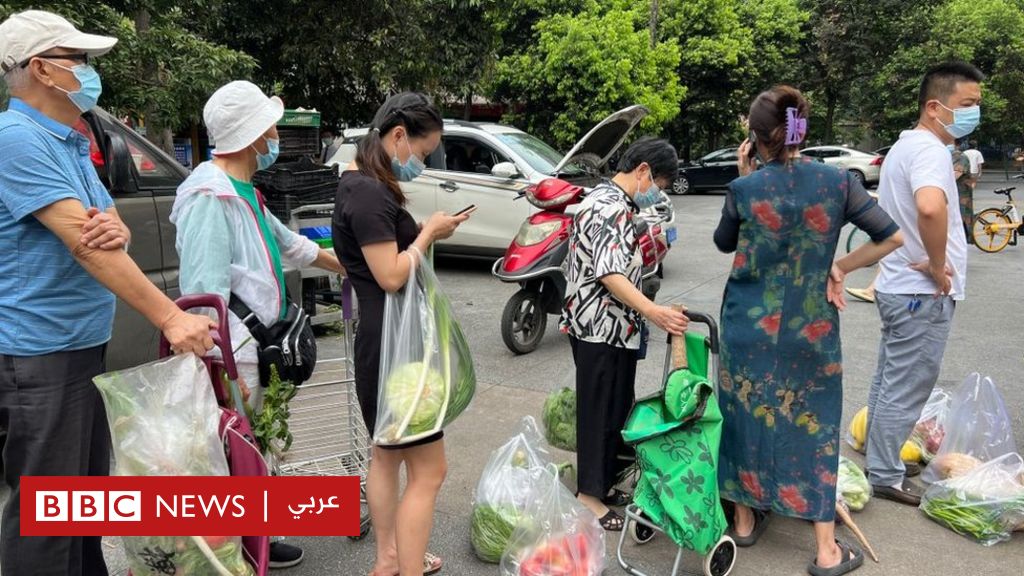September 12, 2022
photo released, Getty Images
—
Residents flocked to buy vegetables in Chengdu following the imposition of closures
–
People across China complain of shortages of food and basic materials, following the shutdown measures to deal with the Corona virus.
–
Tens of millions of residents in 30 regions have been directed to stay in their homes, in implementation of partial or total closure measures.
–
A resident of western Xinjiang said: “It’s been 15 days and we don’t have flour, rice, eggs. Days ago we didn’t have milk for the children.”
–
Chinese authorities are trying to contain the outbreak of the epidemic before the date of the Chinese Communist Party Congress in October.
–
China’s zero-Covid policy calls for rigorous closures, even though a limited number of infections are reported.
–
On Monday, China recorded 949 new infections nationwide.
–
In this context, the policy of the authorities has aroused rare public opposition among citizens. The authorities have been accused of stifling economic growth.
–
The weeks-long closure prompted residents of the Kazakh autonomous region of Ili on the border with Kazakhstan to seek help via social media.
–
In a video clip, a Uyghur man appeared overwhelmed with emotion, saying that his “three children hadn’t eaten for three days”.
–
In the city of Yining, a document containing more than 300 urgent requests for food, medicine and sanitary napkins was widely published on the Internet.
–
One complained: “I have no money to buy supplies. My wife is pregnant and we have two children. We have no more petrol. My wife needs a medical visit.”
–
A mix of Han Chinese, Kazakhs and Uighurs live in the area.
–
A long-awaited UN report released earlier this month accused China of committing “grave human rights violations” against Uighurs and other Muslim minorities in Shenyang.
–
Human rights groups have reported that more than one million Uighurs have been detained against their will. Authorities say their network of camps is a way to fight terrorism.
–
And the authorities have imposed closure in the capital of the southwestern province of Guizhou, without warning. As a result, 500,000 residents were cut off from their homes, with no chance to prepare.
–
The elevators in the buildings were stopped to prevent people from exiting, the Guardian said.
–
The newspaper quoted a Weibo user as saying: “We can’t buy things online because they don’t deliver and the stores are closed. Does the government treat us like animals or just want us dead?”
–
The closure measures affect Chengdu, the capital of Sichuan province, the largest city after Shanghai, which suffered two months of restrictions at the beginning of the year.
–
Its population of 21 million has been barred from entering or leaving the city, with only residents testing negative for the virus being able to purchase basic necessities.
–
This comes after a heat wave hit the area and an earthquake occurred earlier in the year when residents were seen trying to evacuate their homes while exits were closed.
–
City officials said they intend to lift restrictions in five areas of the city, starting Monday.
–
The extension of the various lockdown measures comes before the National Party conference in mid-October. The event, which takes place once every five years, will see the participation of senior politicians for the first time since the outbreak of the pandemic.
–
Party officials are under severe pressure to ensure the conference runs smoothly. Even a small number of casualties are considered a threat.
–
On Monday, Chinese media said that “a small number of injuries have been registered in Beijing universities, with students returning from other provinces.”
–
China is trying to completely eliminate the spread of the Covid virus, arguing that this is necessary to avoid many infections that could put pressure on hospitals.
–
According to Johns Hopkins University, China has officially registered fewer than 15,000 deaths since the outbreak of the virus.
—


